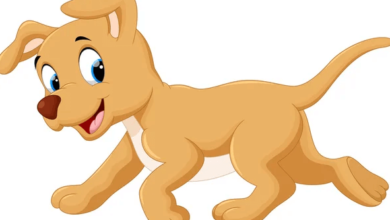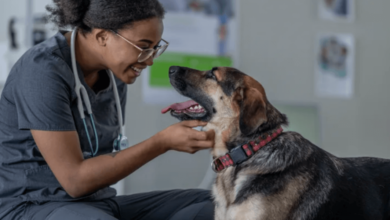Common Reasons Dogs Lick When Being Petted

Understanding Canine Communication Signals
Dogs communicate a lot through their bodies, and licking is just one piece of that puzzle. When your dog is being petted and starts to lick, it’s often their way of talking to you. They might be trying to tell you something about how they feel about the petting, or maybe something else entirely is going on. It’s like they’re saying, “Hey, I’m here, and this is how I’m feeling about this.” Sometimes, it’s a simple acknowledgment, a way to say “I like this” or “I’m okay with this.” But other times, it can mean something a bit more complex. If you’re wondering about your dog’s behavior, especially if they seem off, like if “my dog is shaking and acting weird all of a sudden,” it’s good to look at all their signals, not just the licking.
Interpreting Body Language Cues
When your dog is being petted, pay attention to their whole body. Are their ears relaxed or pinned back? Is their tail wagging loosely or held stiffly? A soft gaze and a relaxed posture usually mean they’re enjoying the interaction. But if they start licking and also show signs of tension, like a stiff body, a hard stare, or a tucked tail, the licking might be a sign of unease rather than pure enjoyment. It’s all about reading the whole picture.
The Role of Submissive Gestures
Licking can sometimes be a submissive gesture. Dogs might lick the faces or hands of humans (or other dogs) they see as higher up in the social hierarchy. It’s a way of showing respect and appeasement. So, when your dog licks you while you’re petting them, they might be acknowledging your role as the leader and expressing their deference. It’s a polite way of saying, “You’re in charge, and I’m okay with that.”
Seeking Reassurance from Their Human
Sometimes, licking during petting can be a bid for reassurance. If your dog is feeling a little unsure about the situation, or perhaps a bit overwhelmed, they might lick to gauge your reaction or to try and calm themselves down. It’s like they’re checking in with you, seeking a sign that everything is alright. If you notice other signs of anxiety, like panting or yawning when you’re not expecting it, this could be a clue that they’re looking for comfort.
Exploring Sensory Stimulation and Comfort
When you’re petting your dog, and they start to lick your hand or arm, it’s often a sign that they’re really enjoying the interaction. Think about it – that gentle stroking, the rhythmic petting, it feels good, right? Dogs have a lot of nerve endings in their skin, and when we hit just the right spot, it can be incredibly pleasurable for them. This tactile input is a big part of how they experience the world, and when it’s positive, like a good petting session, they might respond with licks.
The Pleasure of Gentle Touch
It’s not just about the physical sensation, though. For many dogs, being petted is a way to bond with their people. It’s a quiet, shared moment that builds trust and connection. When your dog leans into your touch or nudges your hand for more, they’re telling you they appreciate it. The licking can be a physical manifestation of that positive feeling, a sort of happy sigh you can see.
Responding to Tactile Input
Dogs also use licking as a way to communicate their feelings. When they’re feeling relaxed and happy under your touch, licking can be their way of saying, “This is great!” It’s a natural response to feeling good, much like how a person might smile or hum when they’re content. They’re processing that pleasant physical sensation and expressing their enjoyment.
A Sign of Contentment and Relaxation
So, next time your furry friend starts licking while you’re petting them, take a moment to appreciate it. It’s usually a good sign that they feel safe, loved, and are simply enjoying the moment with you. It’s their way of saying thank you for the good vibes.
Addressing Anxiety and Stress Responses
Sometimes, when you’re petting your dog, that licking behavior isn’t just about enjoyment. It can actually be a sign that they’re feeling a bit stressed or anxious. Dogs, just like us, have ways of dealing with uncomfortable feelings, and licking can be one of those coping mechanisms. It’s like a self-soothing action for them, a way to try and calm themselves down when things feel a bit overwhelming.
Coping Mechanisms for Nervous Dogs
When a dog is feeling anxious, they might resort to licking as a way to manage their internal state. This can manifest as licking their own paws, the air, or even your hands or face more intensely than usual. It’s their way of trying to regain a sense of control.
Licking as a Self-Soothing Behavior
Think of it like a human fidgeting or chewing their nails when nervous. The repetitive motion of licking can release endorphins, which are natural mood boosters. So, while it might seem odd, your dog is essentially trying to make themselves feel better.
Seeking Calmness During Overstimulation
Sometimes, too much of a good thing can be overwhelming. If the petting is very intense, or if there are a lot of other exciting things happening around them, a dog might start licking to try and dial down the stimulation. It’s their signal that they need a little break or a calmer approach.
It’s important to pay attention to the whole picture. Is your dog’s body language also showing signs of stress, like a tucked tail, flattened ears, or wide eyes? If so, the licking is likely tied to their anxiety.
Investigating Learned Behaviors and Associations
Dogs are smart cookies, and they learn pretty fast, especially when good things happen. When you pet your dog and they lick you, and then you give them a treat or more pets, they start to connect those actions. It’s like they’re thinking, “Hey, licking gets me more of this nice stuff!” This isn’t just random; it’s a learned association. Over time, this can become a habit. They might lick because they know it usually leads to a positive outcome, like a tasty morsel or continued petting. It’s a way they’ve learned to encourage the good vibes.
Positive Reinforcement History
Think about it: if every time your dog licks your hand while you’re petting them, you respond with a “Good boy!” and a scratch behind the ears, your dog is getting a clear message. They’re being rewarded for that licking behavior. This positive reinforcement makes it more likely they’ll repeat the action in similar situations. It’s a simple cause-and-effect that dogs pick up on quickly.
Connecting Petting with Pleasant Outcomes
Your dog’s brain is constantly making connections. When petting feels good and is followed by more petting or a treat, the licking that happened just before that positive experience gets linked to it. So, the licking itself starts to predict the good stuff. It’s not necessarily about the licking being inherently pleasurable for them, but rather what the licking leads to.
Habitual Responses to Affection
Sometimes, licking becomes almost automatic. After enough instances of positive reinforcement, the behavior can turn into a habit. Your dog might lick your hand simply because that’s what they’ve always done when you pet them, and it’s worked out well in the past. It’s a learned response, a sort of ingrained behavior that’s been reinforced over time. It’s like a default setting for receiving affection.
Considering Potential Health-Related Factors
Sometimes, a dog’s licking during petting isn’t just about communication or comfort. It can actually point to something going on with their health. It’s easy to overlook, especially when your dog seems happy otherwise, but it’s worth considering.
When to Consult an Orillia Vet
If the licking seems excessive, happens suddenly, or is accompanied by other changes in your dog’s behavior or physical condition, it’s a good idea to get professional advice. Things like a loss of appetite, lethargy, vomiting, or diarrhea are definite red flags. Even if your dog seems fine, but the licking is a persistent thing, a vet can help rule out any underlying issues. They’ve seen it all, so don’t hesitate to call them.
Exploring Underlying Medical Causes
Several medical conditions can manifest as increased licking. For instance, skin allergies or infections can cause itchiness, leading to licking as a way to soothe the irritation. Dental problems, like a sore tooth or gum disease, might also make a dog lick their lips or the air more often. Neurological issues, though less common, can sometimes cause compulsive behaviors, including licking. It’s all about figuring out if there’s a physical reason behind the behavior.
Gastrointestinal Upset and Licking
Believe it or not, tummy troubles can also lead to licking. Dogs with nausea or indigestion might lick their lips or the air as a response to feeling unwell. This is sometimes called
Differentiating Between Types of Licking
When your dog starts licking your hand or face while you’re petting them, it can be a bit confusing. Is it a sign of pure happiness, or is something else going on? It’s not always as simple as it seems.
Affectionate Licks vs. Anxious Licks
Dogs lick for all sorts of reasons, and the context is key. Affectionate licks are usually gentle and might happen when your dog is relaxed and enjoying your attention. They might lean into you, wag their tail softly, and seem generally content. Think of it as a doggy kiss, a way of saying they feel good and bonded with you. On the other hand, anxious licks can be more frantic or repetitive. You might notice other signs of stress, like a tucked tail, flattened ears, or panting, even when it’s not hot. These licks might be more about trying to calm themselves down or signal discomfort.
Assessing the Context of the Behavior
To figure out what your dog is trying to tell you, pay attention to the whole picture. Where are you petting them? What’s the general mood in the room? If you’re giving them a nice, slow scratch behind the ears and they’re leaning into you with a relaxed body, those licks are probably friendly. But if you’re in a busy, noisy environment, or if they seem a bit tense, the licking might be a way to cope with feeling overwhelmed. It’s like reading between the lines of their body language.
Observing Other Behavioral Indicators
Don’t just focus on the licking itself. What else is your dog doing? Are their eyes soft and relaxed, or are their pupils dilated and their gaze darting around? Is their tail wagging loosely and happily, or is it held stiffly or tucked between their legs? Are they leaning into your touch, or are they trying to pull away slightly?
- Relaxed Body: Loose muscles, soft eyes, gentle tail wag.
- Tense Body: Stiff posture, wide eyes, pinned ears, tucked tail.
- Vocalization: Soft grumbles of contentment versus sharp yips of anxiety.
Sometimes, a dog might lick because they’re trying to get your attention, especially if they’ve learned that licking gets them more pets or a treat. It’s a learned association that can be hard to break if it’s been reinforced over time.
So, What’s the Deal with All the Licking?
So, next time your dog starts giving you those wet kisses while you’re scratching their favorite spot, don’t overthink it too much. It’s usually just their way of saying they’re happy, comfortable, and maybe even a little bit grateful for the attention. It’s a normal dog thing, a little quirk that makes them, well, them. Keep enjoying those petting sessions, and remember that a little lick is often just a sign of a good time for your furry friend. It’s all part of the bond you share.
Frequently Asked Questions
Why does my dog lick me when I pet them?
Dogs often lick when you pet them because it’s a way they show they’re happy and comfortable. Think of it like a doggy hug or a friendly handshake. It can also be a sign they feel safe and are enjoying the attention you’re giving them.
Could my dog be licking because they’re stressed?
Sometimes, licking can be a way for dogs to calm themselves down if they’re feeling a little nervous or overwhelmed. It’s like a self-soothing action, similar to how a person might fidget when they’re anxious. They might be trying to tell you they need a bit more reassurance.
Is licking a behavior my dog learned?
Yes, definitely! Dogs learn that when they lick, good things often happen, like more petting or kind words. If they’ve been petted and licked before and it led to a positive experience, they might just be repeating that behavior because it works for them.
How can I tell if the licking is friendly or a sign of worry?
It’s important to look at the whole picture. Is your dog wagging their tail, relaxed, and leaning into your touch? If so, the licking is likely friendly. But if they seem tense, have their ears back, or are trying to move away, the licking might mean they’re uncomfortable.
Are there any health reasons why my dog might be licking more?
While less common, excessive licking, especially if it’s new or combined with other changes like loss of appetite or vomiting, could point to a health issue. It’s always a good idea to check with your orillia vet if you notice anything unusual about your dog’s licking habits.
Does licking just mean my dog enjoys being petted?
The simple answer is usually yes. Gentle petting feels good to dogs, and licking can be their way of saying, ‘This feels great!’ It’s a sensory response to the pleasant feeling of being touched and cared for by their favorite person.






